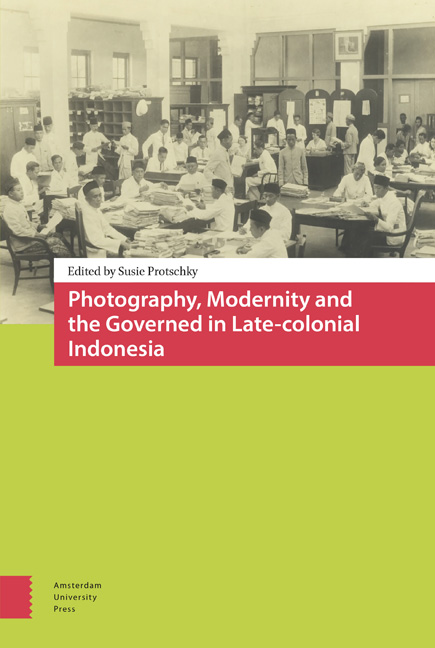Book contents
- Frontmatter
- Contents
- Acknowledgments
- Part I Governing Lenses on Ethical Policy and Practice
- 1 Camera Ethica: Photography, modernity and the governed in late-colonial Indonesia
- 2 Ethical policies in moving pictures: The films of J.C. Lamster
- 3 Ethical projects, ethnographic orders and colonial notions of modernity in Dutch Borneo: G.L. Tichelman's Queen's Birthday photographs from the late 1920s
- 4 Saving the children?: The Ethical Policy and photographs of colonial atrocity during the Aceh War
- Part II Local Lenses on Living in an “Ethical” Indies
- 5 Interracial unions and the Ethical Policy: The representation of the everyday in Indo-European family photo albums
- 6 Reversing the lens: Kartini's image of a modernised Java
- 7 Modelling modernity: Ethnic Chinese photography in the ethical era
- 8 Modernity and middle classes in the Netherlands Indies: Cultivating cultural citizenship
- 9 Say “cheese”: Images of captivity in Boven Digoel (1927-43)
5 - Interracial unions and the Ethical Policy: The representation of the everyday in Indo-European family photo albums
Published online by Cambridge University Press: 11 December 2020
- Frontmatter
- Contents
- Acknowledgments
- Part I Governing Lenses on Ethical Policy and Practice
- 1 Camera Ethica: Photography, modernity and the governed in late-colonial Indonesia
- 2 Ethical policies in moving pictures: The films of J.C. Lamster
- 3 Ethical projects, ethnographic orders and colonial notions of modernity in Dutch Borneo: G.L. Tichelman's Queen's Birthday photographs from the late 1920s
- 4 Saving the children?: The Ethical Policy and photographs of colonial atrocity during the Aceh War
- Part II Local Lenses on Living in an “Ethical” Indies
- 5 Interracial unions and the Ethical Policy: The representation of the everyday in Indo-European family photo albums
- 6 Reversing the lens: Kartini's image of a modernised Java
- 7 Modelling modernity: Ethnic Chinese photography in the ethical era
- 8 Modernity and middle classes in the Netherlands Indies: Cultivating cultural citizenship
- 9 Say “cheese”: Images of captivity in Boven Digoel (1927-43)
Summary
In 2008 a collection of photographs known as the IWI collection (Indisch Wetenschappelijk Instituut, or Indies Scientific Institute) was donated to the state-sponsored, anthropological Tropenmuseum in Amsterdam. Interweaving private memory and public history, this addition to the large archive already accumulated in Dutch museums connects the colonial past and the postcolonial present and future. The more than 60,000 photographs brought together in about 550 albums were taken in the Netherlands Indies (now Indonesia) and belonged to families who lived during the period of the Ethical Policy. The majority of the collection consists of amateur snapshots and captures so-called Indo-European families, that is, families of mixed Indonesian and European descent, posing in and outside colonial homes or on outings.
After Indonesia's declaration of independence in 1945, many photograph albums travelled as personal belongings in the luggage of their owners who “repatriated” to new homes in the Netherlands. In the first chaotic years of arrival and settlement, such albums were kept as souvenirs and personal memories in private domestic spaces. Other albums were found by Dutch military forces in houses abandoned by Europeans and in Japanese army depots during the Indonesian war of independence (1945-49), which broke out immediately after the Japanese occupation of the Indies (1942-45). For unknown reasons, the Japanese had kept photographs and albums in their storehouses, where they were later discovered, and shipped to the Netherlands as reclaimed Dutch possessions. After a number of the albums were returned to their owners, the collection expanded rapidly thanks to many donations by elderly migrants and their children, who wanted these depictions of their family history safeguarded.
The collected photographs shifted from personal to social memory domains when, from the 1950s onwards, they were shared and used by Indies migrants as a public archive. Initiated by Indo journalist and spokesman Tjalie Robinson, this archival process involved a conscious effort to encourage pride in Indo(-European) heritage and identity. Eventually, the photographs, termed the IWI collection, were widely disseminated in various publications and have now become a visual part of the Dutch cultural landscape and national memory. After being digitised the IWI photographic collection was donated to the Amsterdam Tropenmuseum between 2006 and 2008. Unfortunately, the names of many photographers and first owners of the IWI albums are no longer known to us.
- Type
- Chapter
- Information
- Publisher: Amsterdam University PressPrint publication year: 2015

